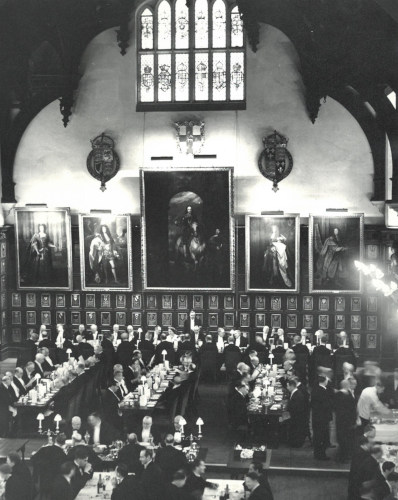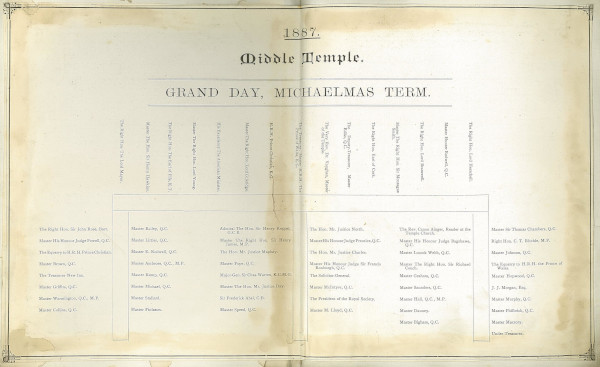Grand Day has for centuries been, and still is, one of the biggest events in the Inn’s calendar. It is a chance for Benchers, barristers, students and guests come together in celebration of the past year through an educational lecture and dinner held in the Elizabethan Hall. This month we will investigate the origin of the event, famous attendees, past menus, and how it runs today.
Photograph of Grand Day Dinner in Hall, 2010.
Grand Day itself originally evolved from the combining of two major feasts, one held at All Hallows' or All Saints' (1 November) and one at Candlemas (2 February). Traditionally, on these days the judges and serjeants-at-law who had been members of Middle Temple (until their transfer to Serjeants’ Inn), returned to their former Inn in their scarlet and violet robes where they were received as honoured guests. Members were encouraged to attend in their own gowns and, ter dinner, a play or music was provided in Hall as entertainment.
Eventually the event started to become known as ‘Grand Day’, originating from terminology used in the Inn during Elizabethan times when the Inn’s Parliament ordered that Christmases would be kept ‘Grandly’ (or, after the Reformation, ‘Solemnly’). By the 17th century, the phrase ‘Grand Day’ was in common use.
However, the event remained an elite occasion, as had been set out in the Inn’s Parliamentary Orders on 27 November 1668. The Order stated that “no gentleman shall appear in the Hall […] on grand days without his gown at dinner time, nor bring in any person not a member to dine in the Hall, on pain of 5l” (five pounds). It added that anyone not a member of the Society was not to dine in Hall unless they were “servants of noblemen or judges or other great persons.” There was the added threat of expulsion at the peril of the Porter who was ordered to remove any “laundress [or] such like persons” who came within the Hall doors at dinner time.

Order of Parliament stating that anyone not a member was not to dine in Hall.
Grand Day has since become a more open event, held every year in celebration of Master Treasurer’s term in office, with Benchers, Hall Members, Students, and their guests all welcome to attend. Grand Day also serves a purpose within the Inn’s educational programme for students wishing to be Called to the Bar, counting as one of the ten qualifying sessions (providing they attend both the dinner and speech), which Middle Temple Students must complete.
Over the years, Grand Day celebrations have been graced by the presence of many important and influential people, ranging from politicians to Royalty, all invited to join the Middle Templars.
Grand Day invitation from 1967 [MT/7/GDV/4/33].
Many royal guests have been entertained at Grand Day throughout the years due to the Inn’s strong connections to the British Royal Family which dates back to 1608, when James I conveyed the lands of Middle Temple over with a sealed patent. Since then, Edward VII, HM Elizabeth the Queen Mother, Princess Diana, and Prince William have all become Royal Benchers and visited the Inn.

The Queen Mother at Grand Day 1950 [MT/19/PHO/1/6].
King Edward VII was a regular attendee of Grand Day, a story from one of his many appearances at the event is that after dinner the Prince lit a cigar, forcing the Bench to alter the rules, at the earliest possible moment, to permit smoking at High Table on Grand Day. HM Queen Elizabeth, The Queen’s Mother was also a reliable presence at Grand Days for fifty-seven years, having a particularly close relationship with the Inn and many of its Benchers.
Queen Mother's Acceptance of Grand Day [MT/7/ROY/7/9].
It was not just the British Royal family invited to Grand Day, in 1967, King Olav V of Norway dined in Hall. Other famous faces were often to be seen in attendance too, such as the politicians Winston Churchill and Clement Attlee, attending in 1949, ambassadors from countries such as France and China, the Archbishop of Canterbury, and the regular presence of Inner Temple’s Treasurer.
The Inn sent out invitations to their guests and once their attendance was confimed, a seating plan was devised, ensuring the smooth running of the event.

Grand Day Table Layout, 1887
However, the event did not always go to plan, and Grand Day was the cause of a few complaints to the Inn. For example, in 1861, one guest made a complaint regarding the bad behaviour of a Mr Prendergast; the complainer explained that he was “dissatisfied by the conduct and language of the gentleman.” Later, in 1865, John Abel wrote to complain that he had difficulty in finding a seat due to the popularity of the event and stated his disappointment with the drink options, as the champagne had been changed to sherry. Later in 1887 James Whigham wrote to the Middle Temple to protest of the non-observance of rank and precedence by certain individuals in Hall at Grand Day. He complained that it appeared that the status of Judges of County Courts was not recognised during the event.
Providing food for the many guest at Grand Day was no easy task; it called for a more elaborate menu to be provided by the chefs of Middle Temple, showcasing a variety of exciting and exotic courses created by the kitchens. The menus - often written in French, as per tradition - show the diverse range of food available, spanning from turtle soup and saddle of lamb to venison and pheasant. In 1724, it was written by the Inn’s Parliament that the food provided by the Inn for Commons on Grand Day was to be “plums broth, minced pies, fowls, roast beef, and wine.” It was also decided that, due to a previous complaint, the roast beef “shall weigh full 4 pounds when brought into the Hall, to which the Cook doth agree.”
Grand Day Menu, 1929 [MT/7/GDV/4/11].
Due to the expectation and cost of more lavish meals, members saw an increase in their commons payments during this period. In 1639, the Inn’s Parliament stated that commons were not to exceed 6s 6d per member per week, except “in the grand weeks of All Hallowtide and Candlemas.” Later in 1724, more specific details were given, stating that cooks were to be given an extra shilling to provide commons for Grand Day, meaning the normal allowance of 7s 7d a week went up to 8s 7d during Grand Week.
However, this budget was still rather tight for the extravagant dinners that were expected, so in May 1785, the Chief Cook put forward a petition that he might be relieved of furnishing oysters and wine on Grand Day. It was approved by the Inn’s Parliament that in future, the expense of these items was to now be borne at the expense of the Society, rather than the Chief Cook.
There were also issues regarding the bill for the wine served at Grand Day with an over expenditure in 1668 where £10 9s 6d was spent on wine, for guest. It was written that in future, stewards must pay for the wine in Hall out of the 2s allowed per man during Grand Week. There were also restrictions on the alcohol allowance during 1949, owing to post-war rationing; this document below shows how specific amounts of alcohol were designated to guests during the evening.
Wine Allowance at Grand Day Dinner, 1949 [MT/7/ROY/7/11].
Due to the popularity of Grand Day, more staff were required to both supervise and serve at the event; there are numerous requests regarding the employment of additional stewards and waiters to satisfy this demand. For example, in 1668, there is record of a man employed to assist the stewards on Grand Day, while in 1766, it was ordered that “hereafter two additional waiters [are to] be appointed to attend in the Hall at Dinner […] during the Grand Week.”
Appointment of two extra waiters at Grand Day, 1668 [MT/1/PPA/189].
In 1790, the waiters at Grand Day put forward a letter asking for a pay increase, in line with the added work they had conducted during the event, stating that “being engaged with extra duties on the Grand Day until the late hour, we ask that you would be kind enough to […] allow us a little extra pay for that night.” The fight for more pay was still prevalent in 1816 when waiters wrote to the Under Treasurer to ask for an increased wage in reflection of their additional work on Grand Day.
A tradition associated with Grand Day is that of the Loving Cup, a shared drinking container, which was passed around between guests as a sign of friendship. The Peter Stoor Loving Cup, which makes up part of the Inn’s Silver collection, was one such cup, used up to the 21st Century. It is inscribed with “His Royal Highness, The Prince of Wales KG, Treasurer, 1887, Peter Henry Edlin Esquire QC Deputy Treasurer” from when it was first used. Instructions on how to use this cup are noted on multiple event menus and information sheets, such as the one below from 1999.
Peter Stoor Loving Cup.
Grand Day is an event that has for many centuries been a key part of the Inn’s social and academic calendar, and still is to this day. It has been attended by numerous people, from students as part of their qualifying for the Bar to prestigious members of the Royal family, all enjoying the delights of dining in the Middle Temple Hall.